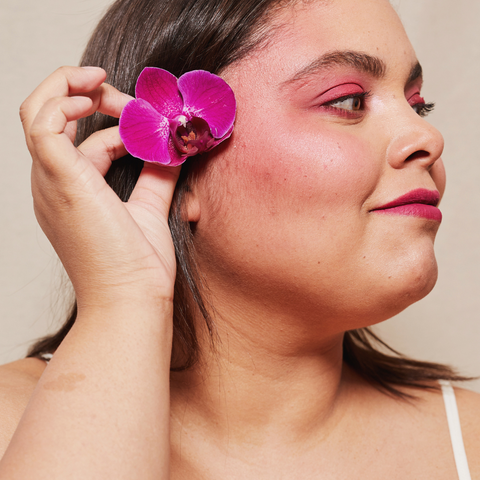Say Goodbye To Hair Loss Anxiety With These Cognitive-Behavioral Therapy Techniques

Hey there, lovely readers! Welcome to another blog post by bia, we're on a mission to spread positivity and empower women to feel confident in their own skin (and hair!). Today, we want to talk about something that affects millions of people around the world: hair loss. Whether it’s caused by genetics, hormonal changes, or other factors, hair loss can be a stressful and emotionally challenging experience.
That’s why we’re here to share some techniques from cognitive-behavioral therapy (CBT) that can help you cope with hair loss and feel better about yourself in the process.

First, let’s talk a bit about what CBT is and how it works. Essentially, CBT is a type of therapy that helps you change the negative thought patterns and behaviors that are causing you distress. It’s all about learning to recognize and challenge your own negative self-talk, and replacing it with more positive and constructive thoughts. Research has shown that CBT can be an effective treatment for a wide range of mental health conditions, including anxiety, depression, and post-traumatic stress disorder (PTSD). And while hair loss might not be a mental health condition per se, it can certainly take a toll on your mental and emotional wellbeing.

According to a study published in the Journal of the American Academy of Dermatology, CBT can be particularly effective for those experiencing hair loss. The study found that participants who received CBT reported a significant reduction in anxiety and depression related to their hair loss, as well as an improvement in overall quality of life.
As Dr. Elizabeth C. Penick, a clinical psychologist specializing in hair loss, notes, "It's important to remember that hair loss is a normal part of life for many people, and it doesn't have to define you or your worth as a person. With the right tools and support, it's possible to manage the emotional impact of hair loss and live a fulfilling, happy life."

So, without further ado, here are some CBT techniques that can help you deal with hair loss:
Practice mindfulness meditation.
Mindfulness meditation is a technique that involves focusing your attention on the present moment, without judgment. It can help you become more aware of your thoughts and feelings, and reduce stress and anxiety. One study found that mindfulness meditation was effective in reducing hair pulling behaviors in people with trichotillomania, a condition that causes compulsive hair pulling. So why not give it a try? Find a quiet spot, sit down comfortably, and focus on your breath. When your mind wanders (as it inevitably will), gently bring it back to your breath.

Identify negative thoughts and feelings related to hair loss:
Start by identifying the thoughts and feelings that are most distressing to you about your hair loss. Are you worried about what others will think of you? Do you feel like you've lost a part of your identity? Write down these thoughts and feelings, and be as specific as possible.
Challenge your negative thoughts.
It’s easy to get caught up in negative self-talk when you’re dealing with hair loss. You might tell yourself that you’re unattractive, that everyone is staring at your bald patches, or that you’ll never feel confident again. But the truth is, these thoughts are just that: thoughts. They’re not necessarily true, and they certainly don’t define who you are as a person. So, the next time you catch yourself thinking something negative about your hair loss, challenge that thought. Ask yourself if there’s any evidence to support it, and if there are any alternative ways of looking at the situation. For example, instead of thinking "I'm unattractive because of my hair loss," you could replace it with "My hair loss does not define my beauty."

Practice positive self-talk:
Once you have challenged your negative thoughts, start practicing positive self-talk. This involves replacing your negative thoughts with positive ones. For example, if you catch yourself thinking "I'm unattractive because of my hair loss," you could replace it with "I am more than my hair, and I have other qualities that make me attractive." and "I am beautiful"
Repeat positive affirmations:
Another technique to reinforce positive self-talk is by repeating positive affirmations. These are short, positive statements that you can say to yourself regularly. Some examples of positive affirmations for hair loss include "I love and accept myself, hair loss and all" and "My hair does not define my worth as a person."

Set small, achievable goals.
It can be overwhelming to think about regaining all of your hair overnight. But the truth is, hair growth is a slow and gradual process. So, instead of focusing on the end result, set small, achievable goals for yourself. Maybe you want to try a new hair care product, or experiment with a different hairstyle that works with your current hair situation. Whatever it is, make sure it’s something that you can realistically accomplish, and that you’ll feel proud of when you do.
Seek support.
Dealing with hair loss can be isolating, but you don’t have to go through it alone. Reach out to friends, family members, or support groups who can offer a listening ear and a shoulder to lean on. You might also consider seeing a therapist who specializes in hair loss or body image issues. There’s no shame in seeking help when you need it.

Well, my friends, we've learned a lot today about the wonderful world of cognitive-behavioral therapy and its potential to help those struggling with hair loss. From understanding the underlying thought patterns that may be contributing to stress-related hair loss, to learning practical techniques for managing stress and anxiety, CBT offers a wealth of tools and resources for those looking to promote healthy hair growth.
And let's not forget the power of positive affirmations! By focusing on self-love and self-acceptance, we can create a more positive outlook and reduce the negative impact of stress on our bodies and our hair.
So, whether you're dealing with hair loss or simply looking to improve your overall well-being, CBT may be just the thing you need to feel your best. Remember to stay positive, practice self-care, and keep on shining!
Sources:
- American Psychological Association. (2021). Cognitive behavioral therapy. https://www.apa.org/therapy/types/cognitive-behavioral-therapy
- American Hair Loss Association. (n.d.). What is CBT? Retrieved from https://www.americanhairloss.org/treatment/cognitive_behavioral_therapy.asp
- Furr, R. M., & Westefeld, J. S. (2013). Psychosocial and behavioral aspects of chronic illness and disability. Springer Science & Business Media.
- Rizzo, A. S., & Koenig, K. (2015). Is cognitive-behavioral therapy more effective than other therapies?: A meta-analytic review. Clinical Psychology Review, 37, 55-63. doi: 10.1016/j.cpr.2015.02.005
- American Academy of Dermatology Association. (2020). Hair loss: Diagnosis, treatment, and outcome. https://www.aad.org/public/diseases/hair-loss/diagnosis-treatment
- National Institute of Mental Health. (2018). How psychotherapy works. https://www.nimh.nih.gov/health/topics/psychotherapies/index.shtml#part_145370
- National Institute of Mental Health. (2021). Cognitive behavioral therapy. Retrieved from https://www.nimh.nih.gov/health/topics/cognitive-behavioral-therapy-cbt/index.shtml
- Cui, J., Shen, D., Wang, K., Chen, J., & Chen, Y. (2020). Effectiveness of cognitive behavioral therapy on quality of life and psychological well-being among patients with androgenetic alopecia: A systematic review and meta-analysis. Dermatology and Therapy, 10(6), 1205-1217. doi: 10.1007/s13555-020-00453-4
Haircare for the soul, charged with positivity.




Comments